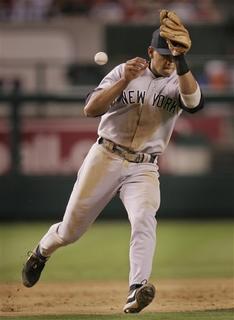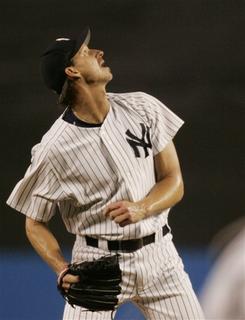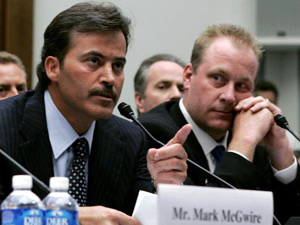This is going to be good.
HOUSTON ASTROS:
For the first time in history, the Houston Astros are in the World Series. Heck, last year was the first time in history the Houston franchise had ever won any postseason series, and they came damn close to getting into that World Series, missing the opportunity narrowly because injuries forced them to start Brandon Backe and Pete Munro twice each. Backe had barely 100 major league innings to his credit before the 2004 playoffs, with a considerably worse than league average ERA, and Munro was so good that the Astros released him after the season. This year he went 10-7, with a 4.56 ERA...in AAA Columbus.
But this season, it's different. Sorta. The Astros have not one or two, but three, top-flight, #1-type starting pitchers, in Roger Clemens, Andy Pettitte and 2005 NLCS MVP Roy Oswalt. Backe is still with the team, and is still mediocre, but if he gets more than one start it will be because Oswalt has assassinated Clemens and Pettitte, which isn't likely.
The trouble for Houston, as you likely know, is that they can't hit. As a team, the 2004 Astros were 5th in the NL in runs scored, 6th in OBP and 6th in slugging. Not awesome numbers, by any stretch, but they got guys on base enough and hit for sufficient power to score more runs than all but five of the 16 National League clubs.
This season, however, is a different story. The 2005 Astros were 13th in batting average, 12th in OBP and 11th in slugging, which allowed them to rank 11th out of 16 NL teams in scoring runs. (For reference, only one team in the American League scored fewer runs than Houston did: The Minnesota Twins. The Twins only scored five fewer runs than the Astros, and if you ask me, they have a better excuse, since there are only two of them, compared with nine Astros.)
There are two factors here that play into how good or bad the Astros' offense really is: Injuries and the Ballpark.
Or should I say, the "Juice Box"? Minute Maid Park played like a slight pitcher's park this year, but in actuality is generally thought to favor hitters, and for the Astros, it certainly did. The Killer Bees had a .776 OPS at home this year, averaging 4.44 runs per contest, but those numbers dropped to .687 and 4.06 on the road, second to last in the NL in road scoring, which helps to explain why they went onlu 36-45 in Away games.
In terms of injuries, the absence of Jeff Bagwell for most of the season and of Lance Berkman for the first month or so hurt them tremendously. Jeff Kent's departure hurt the team at two positions, sending Craig Biggio back to second base, where he hit approximately as well as he had in 2004, but not as well as Kent did, and forcing the Astros to play Chris Burke in left field, where he hit .248 with 5 homers in over 100 games.
The departure of Carlos Beltran, something of a blessing in disguise as it would turn out, made S-DOM ("Speed Demon/Out-Machine", pronounced "saddam") Wily Taveras the regular centerfielder. Bagwell's injury forced Mike Lamb into service at least until Berkman returned from the DL. Lamb was a shadow of his 2004 Self, hitting only .236 in half a season's worth of at-bats, compared to .288 last year. Even when Berkman returned, his injury limited him to mostly 1B/DH duties, and he could not hit with the authority he had shown in the past, and could not run at all. His OPS dropped from 1016 to 935, still very good, but not transcendent, as he had been in 2004.
With a chance to play every day in right field, Jason Lane did not disappoint, hitting 26 homers, but with a .316 on-base percentage due to an atrocious batting eye. Adam Everett lost about 50 points of OPS from his career-best 2004 numbers, but returned essentially to his normal production levels. Brad Ausmus did what Brad Ausmus always does, namely: catch the ball and make outs, 290 of them in 387 at-bats, to be precise. But only one error.
So just about everybody in the lineup was worse than thier 2004 counterpart, except Lane, who was essentially a wash with the Biggio of 2004, and Morgan Ensberg, who brought his own OPS up over 200 points to establish career highs in virtually every offensive category. But even Ensberg struggled early in the season, and as a result of his and his teammates' inneptitude, the Astros scored the fewest runs in the major leagues for the first two months, one-third of the season. Even with the returns of Berkmann and perhaps with Bagwell as a DH a couple of times, the Astros still have to struggle to score.
Interestingly enough, their pitchers were also less effective on the road, going from a MLB-best 3.07 ERA at Minute Maid to 3.98 on the road, good for 8th in MLB and 3rd in the NL. Still very good, but not nearly as dominant as they were in Houston. Their overall ERA of 3.51 was 0.02 away from tying St. Louis for best in the majors. Pretty darn good, as they say in France.
CHICAGO WHITE SOX:
The White Sox are a remarkably similar team to the Astros. Take a look at their rankings within their respective leagues for Runs Scored and ERA, and their home and road splits in those areas:
Home ERA Runs
Houston 1st 8th
Chicago 5th 7th
Away ERA Runs
Houston 3rd 15th
Chicago 1st 8th
Total ERA Runs
Houston 2nd 11th
Chicago 1st(T) 9th
Starter ERA
Houston 1st
Chicago 1st(T)
Bullpen ERA
Houston 3rd
Chicago 3rd
Like I said, remarkably similar.
Both teams have excellent starting pitching overall, and very good bullpens, but Chicago's pitchers are hurt slightly by U.S. Cellular Field, which has played as a hitter's park for five of the last six seasons, mostly because of renovations they've been making to the ballpark.
Both teams have sub-mediocre offenses overall, and both offenses are helped by their home ballparks, but this is where the similarity ends. While the White Sox a teeny bit of help from playing in Chicago, going from 9th to 7th in runs scored, the Astros are hurt tremendously by playing on the road, dropping from 11th to 15th in the NL, as I mentioned earler. In short, the Astros go from hitting like Rookie of the Year candidate Tadahito Iguchi at home to "hitting" like Aaron Boone, who will probably be unemployed this winter. The Sox, on the other hand, get some help at home, mostly in the form of the long-ball, hitting 115 of their 200 homers at home. Their closest analog goes from Jeromy Burnitz or Hank Blalock at home to someone more like Aaron Rowand on the road. Of course, Aaron Rowand hits like Aaron Rowand all the time. He can't help it.
Regarding Chicago's pitching, you've certainly heard by now about the four consecutive complete game wins by the White Sox in the ALCS against the Angels. Don't count on that happening again, though, as it had been 37 years since a team had four complete game victories in a postseason series, and that was in the Year of the Pitcher. It's been half a century since there were four consecutive complete games by one team in a playoff series, and there wer eactually five streainght by the Yankees that year, 1956, when I think some other significant postseason pitching accomplishment might have occurred. You have to go back to 1928 to find the last time four straight complete game victories were hurled by one team, so I'm guessing one week is not a long enough time to see anything like that again.
Certainly the Pale Hose have some good starters, as Mark Buhrle, Jon Garland, Jose Contreras and Freddy Garcia finished 3rd, 9th, 11th and 21st in ERA among qualified American League pitchers in 2005. All four of them started 32 or 33 times and pitched at least 204 innings, all won 14 to 18 games, and all struck out at least twice as many as they walked. None of them is likely to win the AL Cy Young Award, though Buhrle in particular would be a good candidate if he'd gotten better run support. None of them has the presence or reputaiton of any of the Big Three in Houston, but all are certainly capable of keeping the White Sox in games, especially against a team that struggles to score runs the way the Astros do.
Chicago's offense is nothing special. They have only one player who drove in 100 runs, Paul Konerko, and he drove in exactly 100. Nobody scored 100 runs or hit higher than .290, on-based higher than .375, and only Konerko and Jermaine Dye had .500+ slugging percentages. Though they had six players with double digits in steals, only S-DOM Scott Podsednik stole more than 16, and as a team they led the major leagues in getting caught stealing, with 67 failed attempts.
PREDICTIONS:
So, that was my analysis, for what it's worth, but what do I think will happen?
Oswalt, Clemens and Pettitte dominate the White Sox, who get desperate and start making dumb decisions (and outs) on the basepaths. That is, assuming that Clemens' 42-year old hamstrings hold up, Andy Pettitte's church prays harder for him than they did in Game One of the NLCS, and Mr. Zapruder doesn't find a roll of film showing Oswalt entering the Book Depository. (I know, that joke is getting old. Sorry.) It should be a close, low-scoring series, which the Astros should win, 4 games to 3.
Unless they don't.












